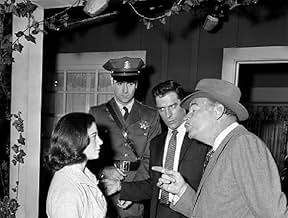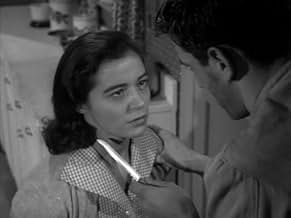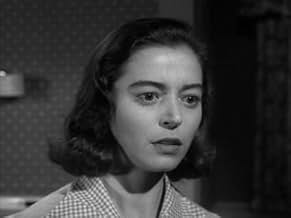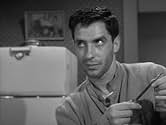You Got to Have Luck
- Episode aired Jan 15, 1956
- TV-14
- 30m
During a massive manhunt for escaped convict Sam Cobbett, Cobbett invades a house where young housewife Mary Schaffner is home alone.During a massive manhunt for escaped convict Sam Cobbett, Cobbett invades a house where young housewife Mary Schaffner is home alone.During a massive manhunt for escaped convict Sam Cobbett, Cobbett invades a house where young housewife Mary Schaffner is home alone.
- Director
- Writers
- Stars
- Willis the Co-Pilot
- (as Bob Patten)
- Pilot
- (as Steve Clark)
- Prison Guard
- (as Bill Pullen)
- Susie Martin
- (as Wendy Winkleman)
- Director
- Writers
- All cast & crew
- Production, box office & more at IMDbPro
Featured reviews
This is one of the episodes of 'Alfred Hitchcock Presents' to be in the "like it" category. No, make that love. Although it is not perfect and its main criticism of its lack of realism is valid, "You Got to Have Luck" to me is a great episode and can totally see why it is one of the highest rated episodes of Season 1. It is one of the best of that season and one of the best of those that Stevens directed. Not sure about it being one of my favourites of 'Alfred Hitchcock Presents', but as far as the first half of Season 1 goes and the season overall it compares favourably.
Will agree that some of Cobett's decision making is rather rash and confused.
And although the twist is extremely clever and completely unexpected, it will be unrealistic to those that have prior knowledge of what it revolves around.
However, there is so much great here. John Cassavetes is the main reason as to why "You Got to Have Luck" works so well, it is an intensely sinister performance that does leave one unsettled. Marisa Pavan is alluring but not passive. Stevens' direction is tight and accomplished, his experience in regard to the series and the genre are evident. The script is thought provoking and lean, and Hitchcock certainly delivers on his dry drollness in the bookending.
Despite not always being easy to swallow, the story is still very suspenseful and full of atmosphere, as well as moving at a lively pace. While the twist doesn't completely come off, its cleverness and "didn't see it coming" factor stop it from being a failure and make it interesting instead. The episode is slickly and atmospherically filmed and the main theme for the series is wonderfully devillish.
Overall, great. 8.5/10.
I gotta say its always a pleasure when you get to see really good performers in these episodes and here we get John Cassevetes who I always loved from "The Dirty Dozen". While he plays the role pretty good, I have to say I'm a little confused by the ambition of the character he's playing (much like fellow reviewer hitchcoc stated). Cassevettes sorta bumbles his was threw the episode making stupid decisions, taking to long, and ultimately coming off a little to nice. Of course this isn't Cassevettes fault, but, more of that of the writers. The best thing that saves it and helps me bump up its rating is the clever twist which I'll admit I actually forgot all about since my last viewing. Marisa Pavan does a good job as our lead actress as does the the supporting cast led by veteran actor Ray Teal who makes his second appearance in the series as a law authority figure.
Did you know
- TriviaIn 1956, this is the first of three guest appearances John Cassavetes made upon the Alfred Hitchcock suspense shows. Two other appearances were in 1964, once guest-starring with his wife Gena Rowlands on Murder Case (1964), and the last appearance on Water's Edge (1964).
- GoofsThe state troopers are flying a Hiller Model 360 when first shown searching for the escapee. In their next flying scene, they are flying a Bell 47.
- Quotes
[first lines]
Himself - Host: Good evening. The, uh, hourglass is a wonderful invention. But I'm afraid it will never replace the sundial. Certainly not in my garden. This one doesn't even work. I sent it to a jeweler's to be cleaned and he removed all the sand.
[puts a small hourglass on top of the big one]
Himself - Host: Fortunately, the second hand still functions. Time is very important to the characters in tonight's story. One of them is doing it. For another, time seems to be running out. Time is also very important in television. We fill it. We must start on it. We must finish on it. And, appropriately enough, we occasionally kill it. I refer, of course, to my own fumbling efforts. Certainly not to the stellar entertainment which follows.
[flips the smaller hourglass]
- ConnectionsRemade as Alfred Hitchcock Presents: Prisoners (1985)
- SoundtracksFuneral March of a Marionette
Written by Charles Gounod
Details
- Runtime
- 30m
- Color
- Aspect ratio
- 1.33 : 1



















